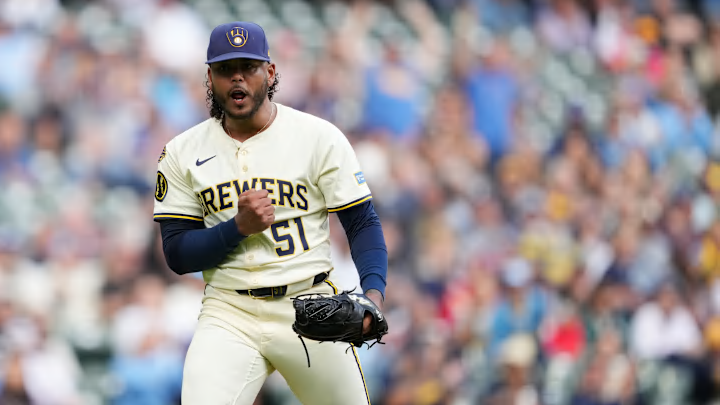It was just a few short years ago that the Milwaukee Brewers possessed the most fearsome trio of starters in the game: Corbin Burnes, Brandon Woodruff, and Freddy Peralta.
Things changed when Brandon Woodruff went down with a shoulder injury toward the end of the 2023 season, as his elongated recovery would prove difficult, keeping him out until July of this season.
The Brewers then traded Corbin Burnes later that same offseason, shipping him to the Baltimore Orioles ahead of 2024 Opening Day to avoid his impending free agency. Just like that, the Brewers' triumvirate of aces was down to a lone wolf.
Peralta has answered the call, accumulating 7.8 bWAR while going 27-14 since the start of last season. His 3.11 ERA in that time leads all qualified Brewers starters, as does his 332.1 innings pitched.
By all accounts, he's filled Burnes' shoes admirably, serving as the team's Opening Day starter in the last two years (Burnes filled that role in 2022-23; Woodruff did so in 2020-21). Unfortunately, the status of "staff ace" in Milwaukee comes with a caveat: You're probably going to get traded before you reach free agency.
With Peralta set to reach free agency after the 2026 season, the Brewers will be at the same point they were when they decided to ship Burnes to Baltimore. Is there any hope that things will be different this time around?
Can Brewers spoil recent trends and keep Freddy Peralta around?
That Burnes trade stung in the moment, but it was long expected to happen. The starter and the team had squabbled over $700,000 in arbitration in prior years, and there was no chance the Brewers were going to hand a 30-year-old starter — even one with Burnes' impressive résumé — $200 million.
The thing is, that Burnes trade wasn't the start of a new precedent—it was the continuation of it. About one decade prior to that trade, the Brewers sent Yovani Gallardo, then the team's Opening Day starter for five consecutive seasons, to the Texas Rangers during the offseason, one year prior to his free agency tour.
Expand the scope beyond the rotation, and you'll probably remember that Milwaukee traded two-time All-Star closer to the Yankees in the exact same circumstances. The same happened to Williams' predecessor, Josh Hader, though he was technically dealt with 1.5 years of team control remaining at the 2022 trade deadline.
The point is: The Brewers have made a habit of trading their best pitchers when free agency is on the horizon. Such is life for a small-market club, but there comes a time when you need to commit to a window of contention and sacrifice a little bit of potential future success.
Losing Peralta this upcoming offseason wouldn't completely sink the Crew — Quinn Priester, Jacob Misiorowski, and Logan Henderson are a heck of a young trio to build around — but, eventually, talent attrition catches up to you. The Brewers are arguably the best team in baseball right now, and their young core means they might get even better in coming seasons. Why jeopardize an elite rotation in 2026 just to acquire a few prospects. Besides the Brewers can still redeem a draft pick if they extend Peralta a qualifying and he declines before signing a major free agent contract, like they did with Willy Adames.
If there's ever been a time for ownership to pony up and keep an All-Star pitcher in town, it's right now.
